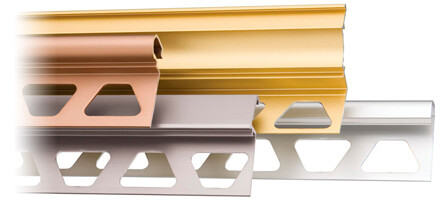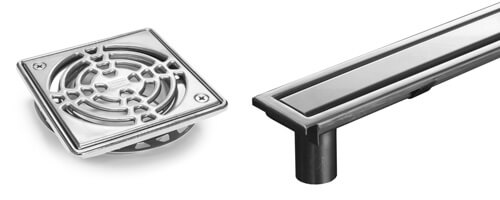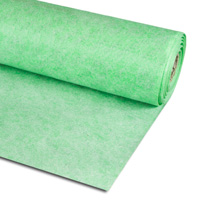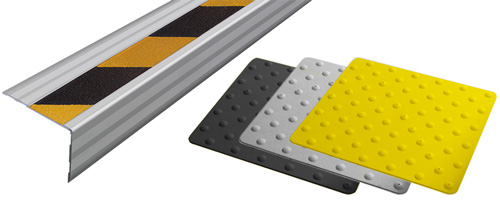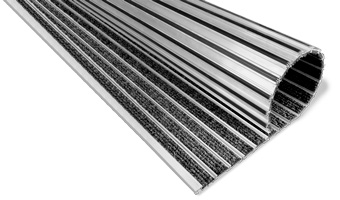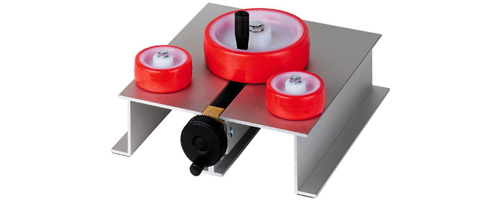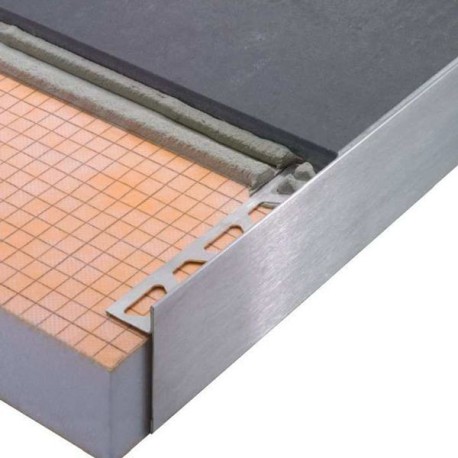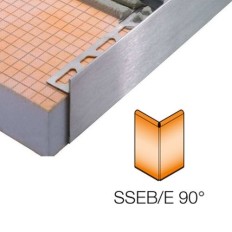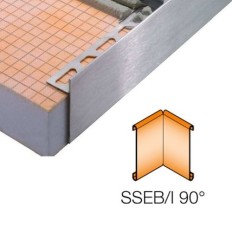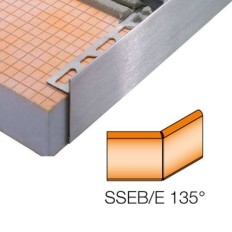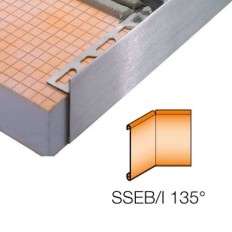SCHIENE-STEP is a high-quality decorative edge protection profile for tile coverings. The profile, which is available in different heights, has variable applications and is particularly suitable for kitchen countertops as well as shelving and stairs with ceramic tile coverings.
The stainless steel profile SCHIENE-STEP-EB, H =6 mm, H1 = 11 mm is a decorative finishing profile that is particularly suited for the installation of tiles over an existing tile covering.
In addition to the decorative properties of the profile, it effectively protects the edges of tiles from mechanical damage.
When used in stairs, SCHIENESTEP is intended for residential or similar interior applications with low foot traffic. Furthermore, STEP-EB is also usable in areas with heavy traffic. The profile is solidly embedded in the covering. Its geometry offers optimal protection of the stair nosing along with good visibility and a high level of safety.
Pre-fabricated parts are available for SCHIENE-STEP-EB to create internal and external corners.
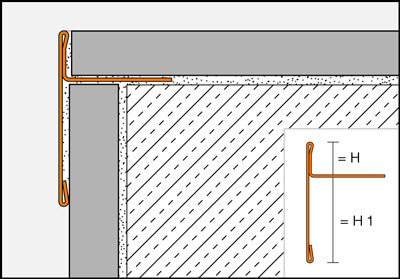
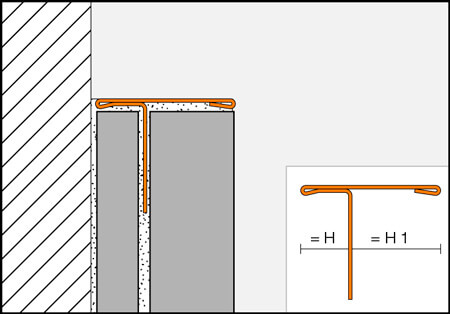
Materials
SCHIENE-STEP is available in the following finishes:
- EB = brushed stainless steel
- AE = anodised aluminium
Material properties and areas of application
In special cases, the suitability of the material type must be verified based on the anticipated chemical, mechanical, and/or other stresses. The information provided below is intended as a general guideline.
SCHIENE-STEP (anodised aluminium): The aluminium features an anodised finish that retains a uniform appearance during normal use. Visible surfaces should be protected against abrasion. Aluminium is sensitive to alkaline media. Cementitious materials, in conjunction with moisture, become alkaline. Depending on the concentration and duration of exposure, this may result in corrosion (aluminium hydroxide formation). For this reason, remove mortar or grouting material immediately from all visible areas and do not cover freshly installed coverings with foil. In addition, ensure that the profile is solidly embedded in the setting material to prevent water from accumulating in small cavities.
SCHIENE-STEP-E (brushed stainless steel) is highly durable and especially suited for application areas that must be resistant to chemicals and acids, such as food industry facilities, breweries, dairies, industrial kitchens and hospitals, as well as residential areas.Even stainless steel is not resistant to all chemical stresses, and may be affected by, e.g., hydrochloric and hydrofluoric acid or certain chloride and brine concentrations. Special anticipated stresses should therefore be verified in advance.
Installation
- Select SCHIENE-STEP according to the tile thickness.
- Apply tile adhesive to the area where the perforated anchoring leg will be placed, using a notched trowel.
- Press the trapezoid-perforated anchoring leg of SCHIENE-STEP firmly into the adhesive and align it.
- Trowel additional tile adhesive over the perforated anchoring leg to ensure full coverage.
- Firmly press the adjoining tiles into place and align them in such a way that the upper profile edge is flush with the tile (the profile should not protrude over the surface of the covering; preferably, it should be approx. 1 mm below the top level of the covering). The tiles must be fully embedded in the area of the profile.
- The tile is set to the lateral joint spacer, which creates an evenly spaced joint of 1.5 mm. In the case of stainless steel profiles, a joint of approx. 1.5 mm is recommended.
- Use suitable materials and tools for the sensitive surfaces to avoid scratches or other damage. Residue of mortar and tile adhesive should be removed immediately.
- The pre-fabricated parts for SCHIENE-STEP-EB should overlap the profile by at least 10 mm. They cannot be subsequently attached, but must be laterally inserted as part of the profile installation and adhered with spots of a suitable installation adhesive ( KERDI-FIX).
Notes
SCHIENE-STEP requires no special maintenance or care. Do not use abrasive cleaning agents on the sensitive surfaces. Damaged anodised surfaces can be restored with paint.
The surfaces of stainless steel profiles can be polished with commercial chrome-polishing products. Stainless steel surfaces exposed to the environment or aggressive substances should be cleaned periodically using a mild household cleaner. Regular cleaning maintains the neat appearance of stainless steel and reduces the risk of corrosion.
All cleaning agents must be free of hydrochloric and hydrofluoric acid. Avoid contact with other metals, such as regular steel, to prevent corrosion. This also includes installation tools such as trowels or steel wool, e.g. for the removal of adhesive and grout residue. We recommend the use of the stainless steel cleaning polish CLEAN-CP.

